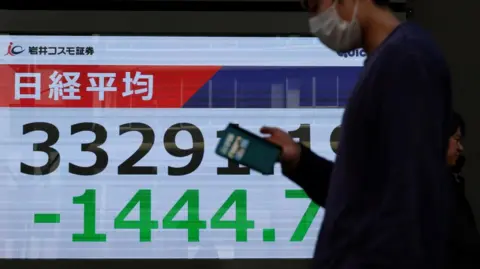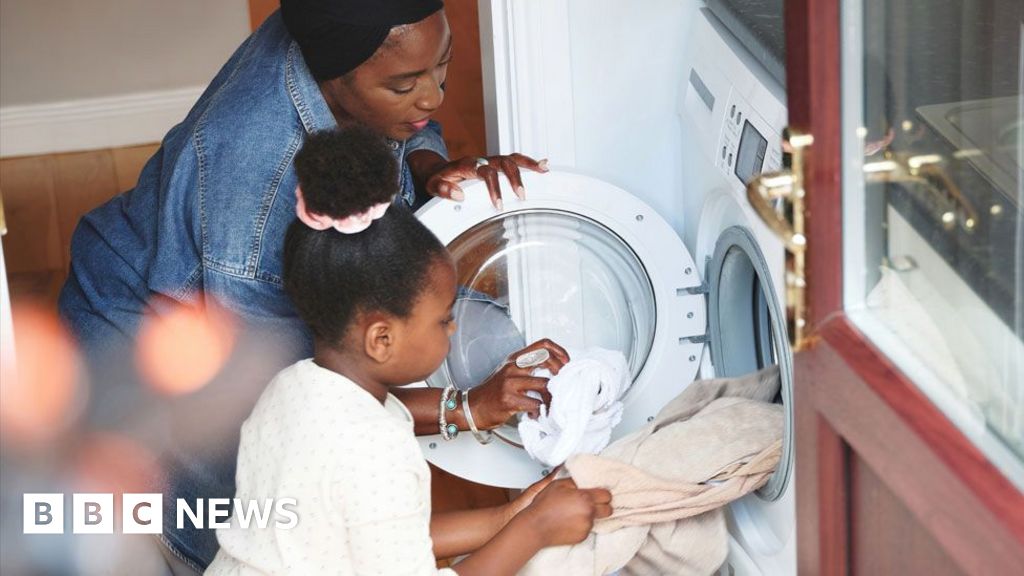Tom Espiner
Business reporter, BBC News

 Getty Images
Getty Images
Shares fell again on Friday as markets continued to react to the uncertainty surrounding the economic impact of US tariffs.
European markets saw further falls as trading got under way, with the UK's FTSE 100 index down 1.8% and Germany's Dax dropping 2%. Asian markets had also declined earlier.
The sweeping new tariffs announced by President Donald Trump on Wednesday triggered a slump in global stock markets, with US markets having their worst day since the impact of the Covid pandemic in 2020.
Traders are concerned the tariffs will increase prices and weigh on growth in the US and abroad.
Trump told reporters on Thursday he thought things were going "very well", adding: "The markets are going to boom."
But on Friday markets continued to slide, with France's Cac 40 index down 1.4%.
Trump has said the tariffs will boost US economic growth, but some economists have warned of a slowdown in the US and in the global economy.
The managing director of the International Monetary Fund (IMF), Kristalina Georgieva, has said the new tariffs "clearly represent a significant risk to the global outlook at a time of sluggish growth".
She said the IMF was still looking into the "macroeconomic implications" of the measures and stressed the need to avoid actions that could do more damage to the global economy.
Russ Mould, investment director at AJ Bell, said the "relentless selling" had continued despite investors "hoping the pain would go away".
"There are so many moving parts that getting your head around the situation [as an investor] isn't easy," he said.
"With countless sectors set to be hit by tariffs, it's difficult to know where to begin to comprehend the situation."
Banking stocks fell on economic growth fears and expectations that central banks would make more interest rates cuts to encourage spending.
Some economists are concerned about a US and global slowdown, meaning banks would be lending less, and lower interest rates mean banks make lower margins.
HSBC shares dropped more than 5.6%, UBS fell about 3.8%% and BNP Paribas slid 5.7%. That followed sharp sell-offs of Asian and US banks on Thursday.
The dollar index, which measures the US currency against six peers, had sunk 1.9% on Thursday, the sharpest drop since November 2022, but on Friday it regained some ground, rising by 0.6%.
By mid-morning on Friday:
The FTSE 100 share index was down 1.8% at 8,321 pointsThe Cac 40 was down 1.4% at 7,469 pointsThe Dax was down 2% at 21,267 pointsFriday's falls came after the tariff announcement triggered the steepest drop in US stocks since 2020 on Thursday.
The US S&P 500 share index closed down 4.8% while the Nasdaq - which is dominated by tech firms - sank by nearly 6%.
Nike, Apple and Target were among big consumer names worst hit, with all of them seeing their shares plunge by more than 9%.

 Movie
Movie 2 months ago
79
2 months ago
79 



![Presidents Day Weekend Car Sales [2021 Edition] Presidents Day Weekend Car Sales [2021 Edition]](https://www.findthebestcarprice.com/wp-content/uploads/Presidents-Day-Weekend-car-sales.jpg)



 English (United States)
English (United States)